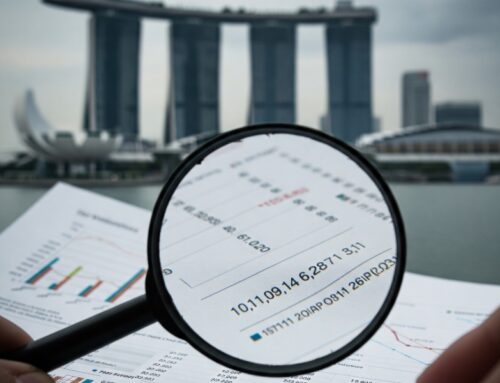Q: What is the corporate income tax rate in Singapore?
A: The corporate income tax rate in Singapore is 17% of chargeable income. This applies to both local and foreign companies.
Q: What is chargeable income?
A: Chargeable income refers to a company’s taxable income after deducting tax-allowable expenses.
Q: On what basis is corporate income tax assessed in Singapore?
A: Corporate income tax is assessed on a preceding year basis in Singapore. For example, income earned in the financial year 2023 will be taxed in 2024.
Q: What does “Year of Assessment” (YA) mean?
A: “Year of Assessment” (YA) is the year in which the company’s income is assessed to tax.
Q: What types of income are taxable under Singapore’s Income Tax Act (ITA)?
A: According to Section 10(1) of the ITA, income tax is payable on:
- Gains or profits from any trade, business, profession, or vocation.
- Gains or profits from any employment.
- Dividends, interest, or discounts.
- Any pension, charge, or annuity.
- Rents, royalties, premiums, and any other profits arising from property.
- Any gains or profits of an income nature not falling within the preceding categories.
Q: Does Singapore tax capital gains?
A: Generally, Singapore imposes income tax on gains in the nature of income, and not capital gains, as there is no capital gains tax regime in Singapore.
Q: How is it determined whether a gain is income or capital?
A: The consideration of whether a gain is in the nature of income or capital is a highly fact-specific inquiry.
Q: Is foreign-sourced income taxable in Singapore?
A: Generally, foreign-sourced income is not taxable in Singapore, unless it is received or deemed received in Singapore.
Q: Under what conditions is foreign-sourced income considered received or deemed received in Singapore?
A: Under section 10(25) of the ITA, foreign-sourced income is received or deemed received in Singapore if it is:
- Remitted to, transmitted, or brought into Singapore (e.g., remitted into a Singapore bank account).
- Applied in or towards satisfaction of any debt incurred in respect of a trade or business carried on in Singapore.
- Applied to purchase any movable property which is brought into Singapore.
Q: What does Section 14(1) of the ITA say?
A: Section 14(1) of the ITA outlines the general deduction formula, stating that deductions are allowed for outgoings and expenses wholly and exclusively incurred during that period by that person in the production of income.
Q: What are some examples of specific deductions allowed under ITA?
A: Specific deduction examples include:
- Interest and loan-related expenses.
- Rent for premises occupied for the purposes of acquiring income.
- Expenses for repair and renewal of tools and equipment (under certain conditions).
- Bad debts of a trade, business, profession, or vocation.
- Obligatory contributions by an employer to a pension or provident fund (subject to rules and ceilings).
Q: What types of expenses are not allowed for deduction under ITA?
A: Section 15(1) of the ITA disallows the deduction of certain types of expenses, including:
- Any disbursements or expenses not being money wholly and exclusively laid out or expended for the purpose of acquiring the income.
- Any capital withdrawn or any sum employed or intended to be employed as capital (except as provided in section 14(1)(h)).
Q: What are capital allowances?
A: Part 6 of the ITA provides for capital allowances to be made to a taxpayer for depreciating assets.
Q: What is the main class of assets qualifying for capital allowances?
A: The main class of tangible assets qualifying for capital allowances is plant or machinery.
Goods and Services Tax (GST)
Q: What is the current GST rate in Singapore?
A: The current GST rate in Singapore is 9%.
Q: What does Section 8(1) of the Goods and Services Tax Act (GSTA) state?
A: Section 8(1) of the GSTA states that tax is charged on any supply of goods or services made in Singapore where it is a taxable supply made by a taxable person in the course or furtherance of any business carried on by the taxable person.
Q: What are the conditions for GST to be chargeable?
A: For GST to be chargeable:
- A supply of goods or services must be made.
- The supply must be a taxable supply (i.e., not an exempt supply).
- The supply must be made by a taxable person (i.e., GST-registered or required to be registered).
- The supply must be made in Singapore.
- The supply must be made in the course or furtherance of a business.
Q: Who is considered a taxable person under GSTA?
A: A taxable person is a person who is registered or is ‘required to be registered’ under the GSTA.
Q: When is a business required to register for GST in Singapore?
A: A business is required to be GST-registered in Singapore if:
- Its total amount of taxable supplies of goods or services made in Singapore has exceeded SGD 1 million in a calendar year (retrospective basis).
- Its total amount of taxable supplies of goods or services made in Singapore is reasonably expected to exceed SGD 1 million in the next 12 months (prospective basis).
Q: Can a person voluntarily register for GST?
A: Yes, a person who is not liable to be registered may apply for voluntary registration under certain conditions.
Q: For how long does voluntary registration last?
A: The registration would be for a period of not less than two years, unless the Comptroller allows for a shorter period.
Q: What are the two regimes relevant to imported services, remote services, and distantly taxable goods supplied by an overseas supplier to a customer belonging in Singapore?
A: The two regimes are:
- Overseas Vendor Registration (OVR) regime
- Reverse Charge regime
Q: What is the Overseas Vendor Registration (OVR) regime?
A: Under the OVR regime, GST is chargeable on a supply of distantly taxable goods and remote services made by a taxable person (including overseas suppliers) to a customer who belongs in Singapore.
Q: What are “remote services”?
A: Remote services include services where, at the time of performance, there is no necessary connection between the place where the services are physically performed and the location of the customer. Examples include downloadable digital content, subscription-based media, software programs, professional services, education and examination services, personal services, and consultancy and advisory services.
Q: What are the OVR registration thresholds for overseas suppliers?
A: The overseas supplier must register for GST if:
- In a calendar year, its global turnover has exceeded SGD 1 million and the value of remote services and distantly taxable goods made to non-GST registered customers belonging in Singapore has exceeded SGD 100,000 (retrospective basis).
- In the next 12 months, it reasonably expects that its global turnover will exceed SGD 1 million and the value of remote services and distantly taxable goods made to non-GST registered customers belonging in Singapore will exceed SGD 100,000 (prospective basis).
Q: What is the Reverse Charge regime?
A: The Reverse Charge regime applies where a supplier who belongs outside Singapore supplies imported services and distantly taxable goods to a person who belongs in Singapore, is GST-registered (or liable to be), is not receiving goods or services as an individual in their private capacity, and is not entitled to full input tax credit.
Q: How does the Reverse Charge mechanism work?
A: The recipient is required to account for GST on the value of its imported services and distantly taxable goods as if it were the supplier. However, in the case of a supply of distantly taxable goods, the recipient doesn’t need to account for GST if they have already paid GST to the supplier.
If you need assistance with corporate income tax or GST matters, you may contact the Raffles Corporate Services tax team at hello@rafflescorporateservices.com.
Yours sincerely,
The editorial team at Raffles Corporate Services







Leave A Comment